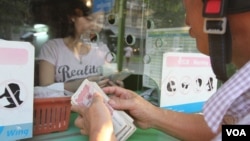Civil society groups have rejected the demands of two financial institution industry bodies to “correct” their reports on indebtedness linked to bank and microfinance debt, instead reiterating their demand that these institutions change their business practices to benefit Cambodian borrowers.
The Cambodia Microfinance Association and Association of Banks released an open letter Wednesday night asking three civil society groups and a workers union to “revise their false reports” immediately. The letter alleged that the reports were “lacking scientific evidence, transparency” and “misses representative significance.”
“These baseless and incomplete reports provide the opportunity to some badly-intended people to take this opportunity to publish and share in an inciting manner, provoking social chaos and affects the reputation and dignity of financial institutions, which is the backbone of the national economy,” reads the Khmer version of the letter.
However, the English version of the letter, published by the CMA on its Facebook page, leaves out the terms “inciting manner” and “provoking social chaos.”
The two industry groups are referring to three reports released by human rights group Licadho, labor rights advocate Central, land rights organization Sahmakum Teang Tnaut and workers union Cambodian Alliance of Trade Unions in the last 12 months.
The letter, however, does not list out specifics that need to be changed in these reports. Prior statements from the CMA have criticized sample sizes and quality of the responses used by the groups, with CMA countering a Licadho report on migration, by alleging the rights group had staged and misrepresented interviews used in a video associated with the report.
In response, the four groups released a joint statement rejecting the request to change any of the reports and stood by the accuracy of their research.
“We will continue to share those voices, even when it means highlighting human rights issues linked to the microfinance and microloan sector in Cambodia,” reads the statement.
They also repeated demands made in each of the reports to refrain from using land titles for loans and microloans from poor Cambodians, publish the number of land titles financial institutions held in the country, and facilitate independent investigations into industry practices.
Kaing Tongngy, a spokesperson for the Cambodia Microfinance Association, said the group had found “irregularities” in the civil society report on migration, which is why they considered it to be unreliable. “We sent them this letter to ask them for correction. We have evidence to prove their report [on migration] is wrong,” he said.
The irregularity, the association alleges, relates to two interviews in the Licadho video, which CMA contends were misrepresented because one of the subjects was not indebted.
Taing Tongngy said if the corrections were not made, CMA would consider a future course of action, but denied using legal recourse for now.
“We are not looking into this option yet,” he said.
In Channy, the president of the Association of Banks in Cambodia and president of Acleda Bank, could not be reached for comment on Thursday.
On July 2, Acleda Bank, one of Cambodia’s big commercial banks and recently listed on the Cambodia Securities Exchange, also criticized a report about indebtedness among garment factory workers affected by the pandemic, saying the NGO was curtailing “the rights, freedoms, honor and dignity” of the Cambodian people.
The bank questioned the research findings, saying they were baseless and not professional and called for the authorities to take action against anyone inciting persons or groups that deal with financial institutions.
Am Sam Ath, the deputy director for rights monitoring at Licadho, said the civil society groups were standing by their reports, adding that media reports had found similar practices in the financial sector.
“We stand by our research. We are not the only ones who have been looking at the issue of human rights issues in microfinance,” he said.
“Lots of independent journalists have gone out into the field and reported the same struggles with over-indebtedness that we have.”
